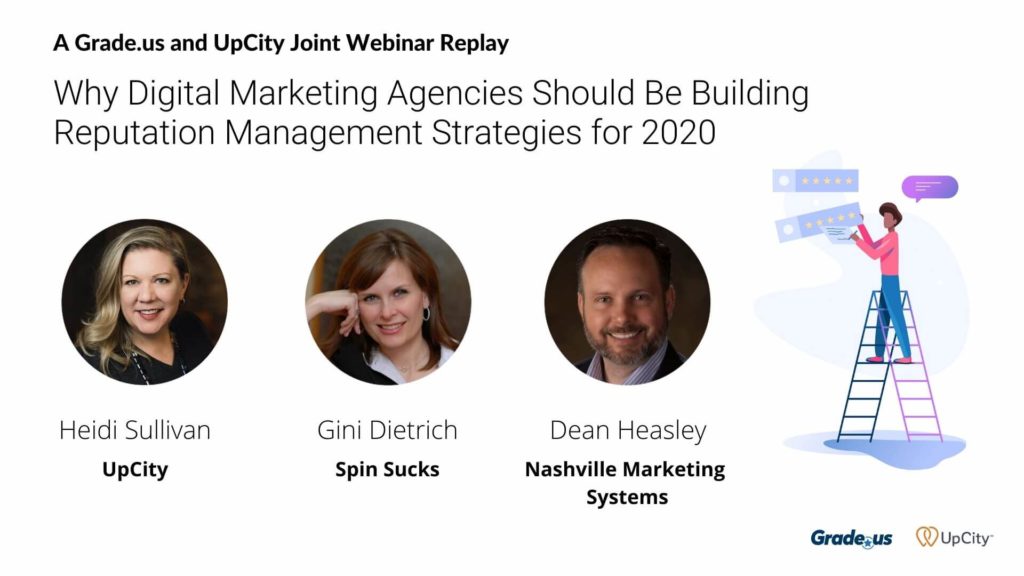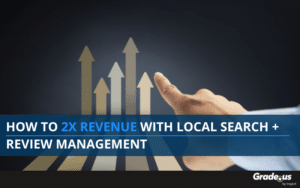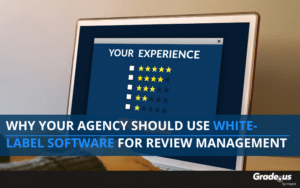As a digital marketing agency, you spend hours of time helping your clients get seen. You help them establish positive reputations online in the channels where they do business.
Now, agency owner, consultant, I’m talking to you. Be honest. How often do you do that for your own business?
If you’re the proverbial cobbler with barefoot digital properties, you might want to check out this webinar.
Our Senior Content Marketing Manager Garrett Sussman teamed up with Heidi Sullivan of UpCity.com, Gini Dietrich of Spinsucks.com, and Dean Heasley of Nashville Marketing Systems to discuss how agency owners and consultants could do more to attend to their own online reputations.
Timestamps for topics:
- How are digital marketing agencies finding clients? What are the most effective channels? (03:07)
- What role does ‘reputation’ play in referrals and word of mouth? (07:05)
- Where should agencies have a presence online? Website/Google My Business/ Review sites? (11:38)
- What types of social proof should an agency have on their website that will help their reputation? (16:00)
- How should an agency represent themselves on review sites? What information is essential to include? What makes an agency stand out from competitors? (25:27)
- What do you think clients are looking for when using review sites to choose an agency? What are clients looking for when it comes to your agency’s reputation? (31:46)
- What are some ongoing tactics that you can implement so your agency always maintains a great reputation? (34:51)
- What are some strategies for producing case studies or earning online reviews from happy clients? (37:17)
- What are some tactics and strategies that you can do now in preparation for 2020? (43:14)
Don’t have time to watch a video? Check out the recap below to walk away with some of the most important insights.
A Digital Marketing Agency's Most Effective Channels for Finding Clients
UpCity did a survey of the marketing agencies in their marketplace and found marketers are neglecting their most important channels. Most agencies get their clients through word of mouth, whether in person or digitally, but spend very little time cultivating the reviews which could help them score those clients.
Sullivan emphasized that B2B companies should be just as vigilant about reviews as B2C businesses.
“They’re looking to see what comparable other businesses are saying about you. There’s no magic bullet, no one place you can be found. You need to be found when and where they’re searching for you, and have that social proof when they get there.”
Dietrich pointed out that reputation management efforts are within our control, whereas the unpredictable ebbs and flows of referrals and word of mouth are not.
According to Heasley, the first page of Google is really serving as your agency’s business card. They get the referral, they Google you, and then you get to talk to them.
Funnels v. Flywheels
Sullivan says that agency owners should rethink the “sales funnel.”
“Think of a flywheel,” she said. “If you’re delighting your customers, they’re going to help you build that reputation. But you have to look at the conversion side, too.”
UpCity recently launched a mystery shopping service for member agencies. According to The Harvard Business Review, you must respond within 5-10 minutes of getting a query if you want to make a sale. After that, there’s a significant drop-off in your ability to close the sale. UpCity found only 45% of marketing agencies are doing this, and 10% wait over 24 hours.
After 24 hours, most of your prospects have moved on.
On Establishing Your Agency's Digital Presence
Much depends on how you want to position yourself…it might be wise for some agencies to put together their own GMB profiles because when you Google PR you get PR agencies in your city, rather than national results.
Dietrich also suggested focusing on placing valuable contributor content with industry trade pubs that accept contributor content. She mentioned Medium as an example of a highly accessible publication potential clients might read.
Heasley is highly local and so focuses on getting links from local businesses to his business, or local publications. He focuses most of his reputation management efforts on Google My Business. He goes in at least once a week to respond to reviews and to post photos.
“Three times as many people are ever going to see your GMB page as are ever going to go to your website,” Heasley points out. “Think about it. They’re on their phone. Maps is the first thing they see. If they see 50 5-star reviews, they’re calling that person.”
Heasley notes that many of his own clients have never seen his website as a result.
All three of our experts noted that people do check out your presence on social channels so it never hurts to have a presence on a few carefully-chosen ones, as long as you’re paying attention to KPIs that help you meet your business goals.
Dietrich really stressed the importance of video testimonials as a humanizing element, something that stands out a bit more than a review from the proverbial “Bill C.”
On the Importance of Humanization Your Agency
Heasley took a moment to focus on how important it is to humanize our agencies. “Even in B2B, people want to do business with a person.”
That’s why Heasley puts his face on all of his profiles, as well as on his website.
“I’ve looked at so many agency websites, and there’s no people. Who’s behind this? There’s no name? Is it a spam site? I don’t know. You want people to know they’re going to do business with this person.”
He tells all his clients to do exactly the same thing. “Make sure it’s there so people know who they are going to do business with. Always try to meet clients face to face if you can. The human element is so important!”
On the Importance of Differentiation
Sullivan cautioned that agencies should understand what makes them different.
“When buyers find something that’s really specific to them that they can relate to, it helps them make a decision. Maybe you’re locally-focused. Maybe you’re focused on B2B vs. B2C, or maybe you have a particular vertical, ie dental. Don’t try to be all things to all people.”
Once you know your “sweet spot” you can make sure the reviews really highlight your uniqueness. You can do this just by asking the right questions when you ask for reviews.
Sullivan also had a surprising piece of information. On UpCity, the information clients most want to see are your core focus areas, and your budget.
“Budget is the first thing buyers are looking for. They’re asking: is this person completely out of my price range? If they are, that’s okay. If you only take larger customers you don’t want someone who has just self-published their book on Amazon to contact you.”
This is surprising, of course, because for many agency owners talking about price up front feels a little taboo. We’re all afraid to chase customers away. On UpCity, this is a little less of a problem because everyone who leaves a review is also sharing their budget range, which means you’re getting social proof attached to those price points.
Dietrich noted she doesn’t love sharing pricing either, but has been challenged to at least put her minimum budget on her site. She pointed out this chased off the tire kickers, and while receiving fewer calls was a blow to her ego, she also realized she was wasting a whole lot less time.
Sullivan also mentions that UpCity allows members to showcase what makes them different through photos, customer images, and video. This is, of course, a strategy which agencies may take advantage of on other sites, like Facebook and Google My Business.
On Embracing Less-than-Perfect Reviews
“I had a prospect say, I don’t believe you guys are a real agency because I can’t find anything negative about you online,” says Dietrich. She actually had to point the prospect (who signed with her) in the direction of some negative feedback before they’d believe she was for real.
Many people have been burned before, so the 4-star review is powerful. It lets people know they’re not just reading a bunch of fake. Even Amazon and Walmart are struggling with fake reviews now, so this is a big deal.
Dietrich also notes the case-study half of the equation is also extremely important in our industry. “The thing I hear most often is, I paid $5000 a month and got nothing.”
She noted it’s hard to measure what we do, but we have to focus on what communications can do for the bottom line, whatever the objective is. Case studies that do that help provide the social proof that says you can actually do the work and get results.
Gathering Reviews as a Digital Marketing Agency
Heasley says he tries to be very intentional about asking for reviews. He tries to find the point where the client is “at the height of happiness.” That’s normally the first or second week when there’s been an interaction.
A lot of times Heasley will get the client set up with (shameless self-plug alert…wait, does it count if Doug Heasley did the plugging?) Grade.us first. Then he’ll say, “I’d be a terrible marketer if I didn’t ask you to give me a review through Grade.us.” By now they’re familiar.
That’s how he’s gotten a substantial number of reviews. He just calls and texts them the link so they can go right there.
Final Advice
Each of our experts closed out with a few final bits of advice.
From Dean Heasley (@NashMarkSysInc)
“Don’t just acquire reviews, amplify. When you get good reviews, copy and paste that and put it in your social media. When someone says something good about you, tell the world they said something good about you. It’s public because it’s on Google or Facebook so it’s all there for the public to consume anyway. When I get a good review I put it on Facebook or LinkedIn. Tell the world, Hey! I made someone happy!”
From Gini Dietrich (@ginidietrich)
“Get those testimonials on video if you can! Get them while they’re happy and then build in the review side of things. I would get that stuff on your website as fast as I could.”
She noted she does her best to make it really simple. She asks their name, business, title, to say what Spin Sucks did, what the result was, and whether they were happy with it. She asks them to record it on their phones and then text it or email it to her. Embedding it on both your site and on YouTube will offer some SEO benefits.
From Heidi Sullivan (@hksully)
“Really think like your perspective buyer. Think about what their experience is. Don’t be afraid to take a look and say: if I were choosing a digital agency right now, how would I stack up against everyone else? What are my key differentiators?”
The buyers at Upcity look at an average of 18 reviews. That’s a lot, but it’s what B2B buyers are looking at these days.
Sullivan also said,
“The hardest lesson for me to learn, when I had my own agency, was don’t say yes to everything. You’re not going to be able to generate positive reviews and have a great online reputation if you can’t fulfill. If prospect expectations are out of whack you can’t satisfy that by working a lot harder. Take on the customers that are the right fit for you, and they can help you build the rep.”
Identifying the right clients helps you get good reviews.
See also: How the Best Marketing Agencies Screen Clients to Avoid Disaster.









